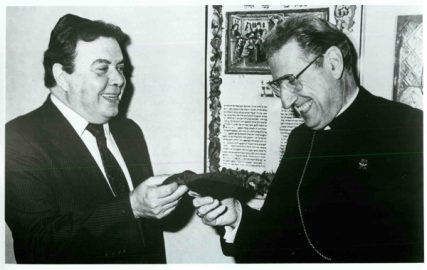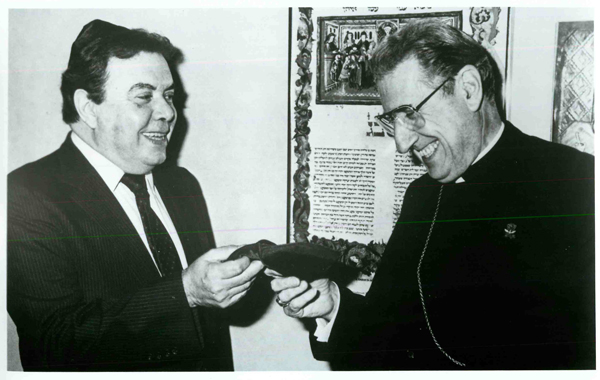Was Cardinal John O’Connor, the late archbishop of New York, technically Jewish?
Few rabbis would say the prelate, whose mother, Dorothy Gumble O’Connor converted to Catholicism long before his birth, could be considered a member of the tribe. But the news that O’Connor’s mother was born Jewish rang familiar. It reminded me of Stephen Dubner.

(1985) Then Archbishop John J. O’Connor, of the New York Roman Catholic Archdiocese, accepts a red yarmulke from Rabbi David B. Kahane of the Sutton Place Synagogue in New York City, prior to joining him on the bimah for a wide-ranging diologue in the synagogue’s Jewish Town Hall series. Religion News Service file photo
Dubner is known now as a co-author of the phenomenally successful Freakonomics books. But in 1996, he wrote a blockbuster cover story for the New York Times Sunday Magazine in which several people – including Dubner – described how they came to chose a different religion than their childhood faith.
Dubner’s parents were both born Jewish. Each, before they met, converted to Catholicism. It was the faith they they loved, lived and taught their children with full devotion the rest of their lives, like O’Connor’s mother.
But when he was in his 20s when Dubner discovered Judaism spoke to his soul.
He later wrote in a memoir, Turbulent Souls, that the article proved painful for his mother. “She was hurt that a child of hers had so publicly rejected the religious truth that she and my father had fought so hard to gain.”
Enter Cardinal O’Connor. On Good Friday that year, O’Connor quoted from Dubner’s article – about Dorothy O’Connor’s love of Jesus – in his noon Mass homily.
Emboldened, Dubner wrote to O’Connor, a prelate his mother much admired, and one known for knowledge and affinity for Jewish-Christian relations. He asked for a meeting, wondering, if the cardinal could advise him on how to help his mother accept his choice.
The meeting began as an interview but quickly turned into a pastoral moment. As he recounts in Turbulent Souls:
O’Connor stressed it was important to have a
“clearly articulated teaching of the Second Vatican Council about the primacy of an informed (italics, Dubner) conscience, a conscience which has been informed by way of thinking, of discussion, of reading, of study, of prayer. Then the deliberate decision that, okay, I know Catholicism, or I know this faith or I know that faith, I know what the Church teaches, I have studied it respectfully, I know what the papal encyclicals say, I have prayed over it, and I am convinced in conscience that God wants me to be this or to be that, to be Jewish or to be Lutheran, whatever it is. So I think if you will tell your mother that you have tried to study this, that you have prayed about it, this is not just a revolt or a rejection, this is not a dismissal of what you don’t understand – that this is where God wants you to be, an informed Jew.”
Dubner sent the transcript to his mother and, over her remaining years, they reached an understanding, one for which Dubner said, O’Connor’s words had laid the foundation.
“I don’t know whether we would have gotten there without him,” Dubner told me today (April 29) when I called about the O’Connor news.
“It is hard for me to believe, knowing that if he knew his mother was Jewish, he would not have discussed that publicly,” said Dubner.
He did know about his parent’s conversion when he was growing up. But, like many converts, as he came to know his chosen faith, he realized there were “customs, moments, ideas and songs “that echoed his parents Jewish upbringing.
“Now I know why my dad whistled, ‘My Yiddishe Mama” and he liked gefilte fish. I knew my parents were weird but I thought it was because they were from Brooklyn,” says Dubner.
No one knows why O’Connor’s mother chose the Catholic Church. Did she follow the path her son suggested decades later? Study. Prayer. Discernment.
Did her Jewish roots shape her son’s Catholic childhood?
“We can only guess at how he came to his deep affinity for the Jewish community,” said Dubner.
“Perhaps he truly intellectually assimilated the Second Vatican Council teaching. Another reason: He was archbishop of New York City, the Jewish capital outside of Israel. Maybe, unconsciously, he assimilated at home an affinity for or connection with Jewish history.”
Ultimately, Dubner said, “he was humanly an awesome person. I loved the guy for a lot of reasons, but I loved him primarily because he lived the model of a modern religious leader who understands the real world is right outside your doorstep.”
You don’t have to be Jewish – by birth or choice or both – to love that.





